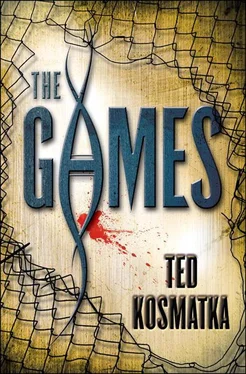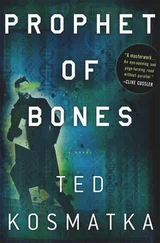She put the last sheet of plasticine down on the table. “What the hell is this thing?” she asked.
“That’s what we’re trying to figure out.”
“No.” She touched his arm. “What is it? I can’t do my job effectively if I’m working in a vacuum. This doesn’t make sense. The night vision, the hearing, the wings. None of these things could help a gladiator in the arena. You need to level with me. Where did this thing come from?”
Silas sighed. She was right. He pulled out a stool and sat. “How much do you know about computer theory?”
“Theory? Not much. The basics, I guess.”
“Ever hear of the Brannin computer?”
“Rings a bell. It’s the new super, right?”
“Yeah. I’ve been doing a lot of research on it over the past several months, and the Brannin isn’t just the latest thing in computer tech. It’s a long step sideways in a direction nobody had ever thought to look before. I don’t think the Brannin should really even be called a computer. There’s very little to it that you can reach out and touch with your hand. Most of it exists in deep VR, and because of that, it’s not limited by physical size. Inside itself, it can be infinitely large or small. Instead of bytes made of zeros and ones, the Brannin uses light, on or off, and that’s the speed at which it computes. Something like six trillion floating-point operations per second, give or take.”
“Who’s counting?”
“You’d be surprised how seriously that record is taken.”
“And you’re going to tell me that the computer helped design the gladiator?”
“No, the Brannin didn’t just help. It did the design almost completely on its own. That’s where the original nucleotide base-pair sequence came from. Helix just provided the nuts and bolts.”
“Can’t you just make the inferences you need from the base-pair sequence?”
“It doesn’t work that way. The nucleotide map translates directly into an amino-acid map, but it gets sticky after that. Protein conformation is more important to protein function than the exact nucleotide read, and conformation is one of the hardest things to pull out of the raw data. Development is too interconnected to itself, and timing plays an important role.”
“Still, you should be able to cross-reference to other species.”
“No, we tried that. There were no matches. But a match might not have helped us much, anyway, unless it was exact. A single base-pair substitution that changes the shape of the resultant protein molecule can completely alter the expression of that gene. There are hundreds of examples of this. And beyond that, enzymatic function is more important even than conformation, and each enzyme is itself under genetic control, so the complexity exists in a feedback loop.”
“I’m beginning to understand. It’s like an algebra problem with a hundred variables.”
“Millions. At this point, it’s still impossible to make the leap from novel nucleotide sequence to resultant gene to physiological expression. It may always remain so. There’s too much structural noise between the three.”
“Well, you still have the computer. It designed the creature. Why do you need me to tell you what it already knows?”
“Because I think the computer has gone crazy.”
“Can computers go crazy?”
“The acorn doesn’t fall far from the tree.”
Evan stepped into his office and closed the door against the stares of the techs in the anteroom. His filing cabinets were overturned, his desk inside out, his stacks of digilogs scattered. Baskov’s men had gone through everything, leaving his office in complete disarray—in short, slightly more messy than usual.
He righted his swivel chair and slid into its familiarity. Only this time, the wailing of its overburdened hinges was missing. It had been so long. Much had changed.
How many weeks? Seven, ten; he didn’t know. But he had been sure that he would never leave that hospital, never be free from the injections, or Baskov’s questions. He looked down at himself and saw half the man he had been.
The drugs they gave him made him too sick to eat, and he had lost whole chunks of himself. He felt naked without the slabs of fat that had cloaked his body for so many years. He was exposed, vulnerable, too small for his baggy skin, which now drooped and sagged around him. Maybe it had been longer than ten weeks. Maybe much longer.
What had they told his techs? He had no friends or family that would require an explanation for his absence, but what about the institute? What had they been told?
He glanced out the window, and the sky was darkening, fading to gray. He didn’t know whether night or a storm approached, but he welcomed either. He welcomed the darkness and wanted to lose himself in it. He looked around for the light switch on the wall but couldn’t find it. The lighting panels had activated automatically when he entered the room.
He picked a desk drawer from the scatter on the floor and flung it upward toward the fluorescent panels. The cheap plastic shield caved, and the bulbs popped in a shower of glass on his head. Picking up the desk drawer, he stepped beneath the next light panel and flung the projectile again. Again, a shower of glass. He moved throughout the room until all the lights had gone blind and he could see only by the dying glow outside the window.
He thought of Pea as night descended. He sat in the clutter and let darkness fold around him. And when he could hold back no more, he wept.
SILAS MET Baskov just outside the broad glass doorway. “Good afternoon,” he said, extending a hand.
Baskov shook it, nodded, then said, “I hear it’s a big day for our young Olympic hopeful.”
“Yes, it is. The trainer thinks it’s time for the first live meal. I thought it would be appropriate for someone from the commission to witness it, and frankly,” he added with a smile, “it will save me the trouble of writing a long-winded report about the event. Now you can report to the commission.”
“I’m sure the trouble will be more than worth it. I’m curious how it’s developing. My eyes and ears have been telling me some interesting stories.”
Silas led him inside and past the elevators. He hated the way Baskov always managed to mention his spies. He referenced them so casually, as if they were of no more interest than the weather. But Silas recognized the warning in Baskov’s informal banter: nothing could be kept secret.
“We’ve recently transferred the gladiator into its new pen,” Silas said, then couldn’t resist: “though I’m certain that your eyes and ears have already informed you of the move.”
Baskov glanced at Silas as they walked.
“It outgrew its old living space,” Silas added.
“I know about that because I signed off on the construction project budget. I don’t even want to mention how much it cost.”
They turned left at the end of the hall and made their way down the final long corridor leading to the rear dome behind the building. At the door, Silas showed his badge to the armed guard and they stepped through.
His nostrils were immediately assaulted by the warm smells of life. It reminded him of the cat house at the Los Angeles Zoo. Tangy, pungent; it was the smell of a predator.
Bright sunlight filtered through steel mesh openings in the roof sixty feet above. Just ahead, a shell of iron bars separated them from the enclosure beyond. Silas lead Baskov toward the group that had gathered. Ben, Vidonia, and Dr. Nelson nodded their introductions.
“Where’s Tay?” Silas asked.
“Last-minute problem with the goat,” Vidonia said.
“Well, I’d have a problem, too, if I was the goat that had to go in there.” Ben pointed between the bars.
Читать дальше












